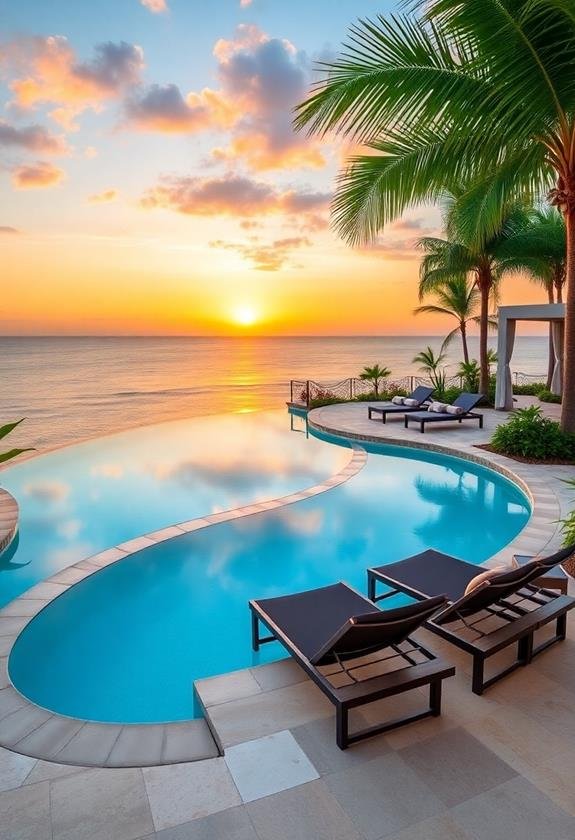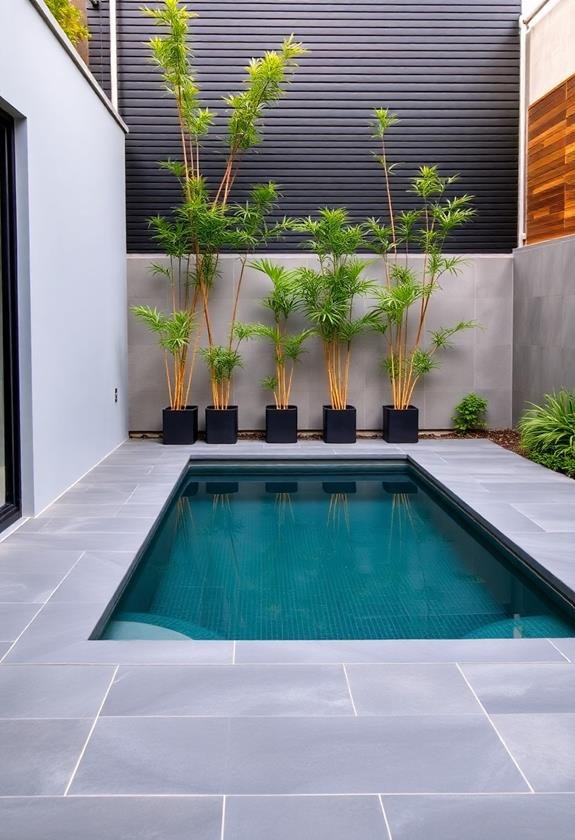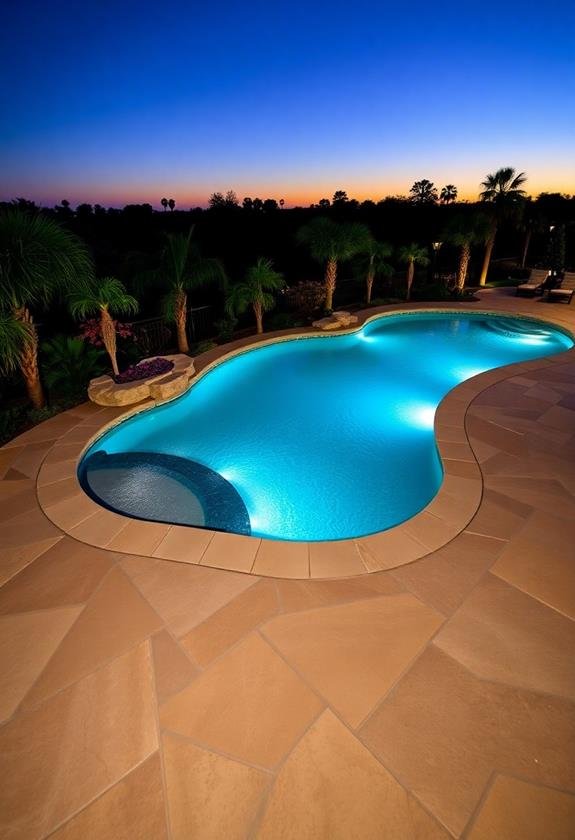Saltwater pools offer you a luxurious, low-maintenance swimming experience with remarkable benefits. You’ll notice gentler effects on your eyes and skin, thanks to the natural salt concentration that mimics your body’s chemistry. The automatic sanitizing system maintains steady chlorine levels, reducing your time spent on pool maintenance by up to 70%. You’ll save money on chemicals while protecting the environment, and your pool equipment will last longer due to reduced chemical exposure. The water feels silkier, similar to swimming in the ocean, and you won’t deal with harsh chlorine smells or irritation. There’s so much more to discover about why homeowners are making the switch to saltwater systems.
Key Takeaways
- Saltwater pools reduce red eyes and skin irritation while providing a silky-smooth, natural swimming experience similar to ocean water.
- Operating costs are significantly lower, with up to 70% savings on chemicals through automatic salt-to-chlorine conversion.
- The self-regulating sanitization system requires minimal maintenance, eliminating weekly chemical additions and frequent monitoring.
- Saltwater systems are environmentally friendly, reducing chemical usage and plastic waste while being gentler on surrounding plants.
- Consistent chlorine levels are maintained automatically, preventing algae growth and ensuring clear, comfortable water quality year-round.
Gentler on Eyes and Skin
Swimming in a saltwater pool is remarkably gentler on your eyes and skin compared to traditional chlorinated pools. You’ll notice the difference immediately – there’s no more red, irritated eyes or that tight, itchy feeling on your skin after a rejuvenating swim. The salt concentration is actually similar to your natural tears, which is why you won’t experience that familiar burning sensation when you open your eyes underwater.
If you’ve ever spent a day at the beach, you’ll understand how your skin feels silky and smooth after swimming in saltwater. Your backyard saltwater pool creates the same effect, and you won’t need to shower immediately to rinse off harsh chemicals.
The natural properties of salt help maintain your skin’s moisture barrier, and you’ll find that even sensitive skin tolerates it beautifully. Plus, if you’re dealing with minor skin conditions like eczema or psoriasis, you might notice some improvement after regular swims.
For the best experience, maintain your pool’s salt levels between 2,700 and 3,400 ppm (parts per million), and you’ll enjoy that spa-like feeling every time you take a dip.
Lower Long-Term Maintenance Costs
Converting your pool to saltwater can deliver considerable cost savings over time. While the initial investment might seem steep, you’ll quickly discover that operating costs drop considerably compared to traditional chlorine systems.
The salt cells typically last 3-5 years, and salt itself is remarkably affordable – you’re looking at about $6-10 per bag compared to $60-80 monthly for chlorine tablets.
Here’s how saltwater pools help you save money in the long run:
- You’ll spend less on chemicals since the salt system generates its own chlorine through electrolysis, reducing your monthly chemical expenses by up to 70%.
- The system requires fewer additives and balancers, as saltwater naturally maintains a more stable pH level throughout the season.
- You won’t need to store or handle harsh chemicals, which means no more emergency runs to the pool store when you’re running low.
- The gentler water chemistry reduces wear and tear on your pool equipment, vinyl liner, and concrete surfaces, extending their lifespan and saving you money on replacements.
These savings add up quickly, often paying for the conversion within just 2-3 seasons.
Reduced Chemical Storage
A major advantage that goes hand-in-hand with those cost savings is the reduced need for chemical storage. When you own a traditional chlorine pool, you’ll need to store multiple containers of chemicals, including chlorine tablets, shock treatments, pH adjusters, and algaecides.
These chemicals require a dedicated storage space that’s cool, dry, and safely locked away from children and pets.
With a saltwater pool, you’ll only need to store a few bags of pool salt and maybe some pH balancers. You won’t have to worry about finding space for bulky chemical containers or maintaining a mini chemistry lab in your garage or pool house.
This simplified storage situation isn’t just convenient – it’s safer too! You’ll reduce the risk of chemical spills, and you won’t have to deal with those strong chlorine fumes that can make your storage area smell like a public pool.
As someone who’s converted from traditional to saltwater, I can tell you that reclaiming that storage space is liberating. You can finally use that corner of your garage for gardening supplies or those pool floats you’ve been wanting to buy!
Automatic Sanitizing System
Through its continuous operation, a saltwater pool‘s chlorinator works tirelessly to maintain consistent sanitization levels without requiring daily attention from owners.
You’ll love how this automated system converts ordinary salt into chlorine through electrolysis, creating a perfectly balanced swimming environment. As someone who’s maintained both traditional and saltwater pools, I can tell you that the automatic sanitizing system is a game-changer for pool maintenance.
Here’s what makes the automatic sanitizing system so effective:
- The system monitors chlorine levels 24/7, adjusting production based on your pool’s specific needs, much like a smart irrigation system tends to your garden.
- You won’t need to manually add chlorine tablets or shock treatments, as the system maintains ideal levels automatically.
- The chlorinator cell typically needs cleaning only every 3-6 months, depending on your pool’s usage and local water conditions.
- Built-in sensors alert you when salt levels need adjustment, similar to how your car’s dashboard warns you about maintenance needs.
You’ll find that this hands-off approach gives you more time to enjoy your pool rather than maintaining it.
Extended Pool Equipment Life
The gentle nature of saltwater systems extends beyond just automated sanitization – it greatly prolongs the life of your pool equipment. Unlike traditional chlorine systems that can be harsh on your pool’s components, saltwater’s lower chemical concentration helps preserve everything from your liner to your pump.
You’ll notice the difference in how your pool equipment performs over time. The salt cells’ steady, measured release of chlorine prevents the corrosive spikes that typically wear down pool components. Your pump and filter will thank you, as they won’t have to work as hard against chemical buildup.
Plus, you won’t deal with those pesky calcium deposits that often plague traditional chlorine pools.
I’ve seen firsthand how saltwater pools maintain their equipment integrity. During my years of pool maintenance, I’ve observed that saltwater pool owners typically replace their equipment less frequently than those with traditional systems.
While the initial investment in a salt chlorinator might seem substantial, you’ll save money in the long run through reduced equipment replacement costs and fewer repair visits.
Just remember to maintain proper salt levels and clean your salt cell regularly for peak performance.
Natural Feel While Swimming
Swimming enthusiasts consistently praise saltwater pools for their silky-smooth sensation against the skin. When you’re gliding through a saltwater pool, you’ll notice an immediate difference in how the water feels compared to traditionally chlorinated pools. The gentler salt concentration creates a more natural swimming experience that’s remarkably similar to floating in the ocean, but without the intense saltiness.
Here’s what makes saltwater pools feel so natural:
- The dissolved salt creates a higher water density, making you feel more buoyant and relaxed while swimming.
- There’s no harsh chlorine smell clinging to your skin or hair, just a subtle mineral clarity that’s reminiscent of a spa.
- Your eyes won’t sting or turn red like they often do in traditional pools, thanks to the lower concentration of harsh chemicals.
- The water feels softer and more luxurious, similar to swimming through liquid silk.
You’ll find that even after extended swimming sessions, your skin won’t feel dried out or itchy. Instead, you’ll enjoy that revitalizing, natural sensation that keeps you wanting to stay in the water just a little bit longer.
Environmentally Friendly Solution
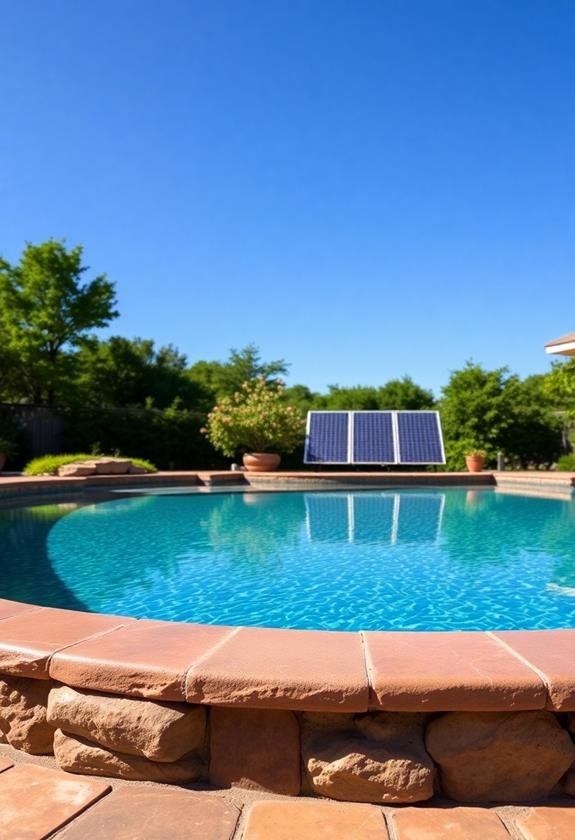
Beyond traditional pool systems, saltwater pools stand as a more environmentally conscious choice for homeowners who want to reduce their ecological footprint. When you switch to a saltwater system, you’ll considerably decrease the amount of harsh chemicals that typically end up in the environment through backwashing and evaporation.
You’re making a smart choice for Mother Nature because saltwater pools require fewer chemical additives than their chlorine counterparts. The natural salt cells generate chlorine through electrolysis, which means you won’t need to store or handle potentially harmful chemicals.
Plus, you’ll love knowing that the water that occasionally splashes onto your garden won’t harm your precious plants or grass.
The environmental benefits extend beyond just chemical reduction. You’ll find yourself using fewer plastic containers since you won’t be buying and disposing of traditional chlorine packaging.
The salt cells in your system typically last 3-5 years, creating less waste compared to the regular purchase of chemical tablets and jugs. If you’re looking to create a more sustainable backyard oasis, a saltwater pool aligns perfectly with eco-friendly landscaping practices and responsible water management.
Less Time Managing Water
Life’s precious hours are better spent swimming than managing pool chemistry, which is why saltwater pools are a gift to busy homeowners.
You’ll find yourself spending far less time monitoring and adjusting your pool’s chemical balance, as the salt chlorine generator does most of the work automatically.
Here’s how saltwater pools save you time and effort:
- Weekly maintenance drops dramatically – you’ll only need to check chlorine levels once every couple of weeks instead of multiple times per week like with traditional pools.
- The salt cell converts regular salt into chlorine continuously, meaning you won’t have to manually add chemicals as frequently or store dangerous chlorine tablets.
- You’ll spend less time shocking your pool since saltwater systems maintain more consistent chlorine levels, preventing the algae buildup that often requires intensive treatment.
- The self-regulating nature of salt systems means you won’t have to constantly balance chemicals after heavy rain or intense sun exposure, which can throw traditional pools out of whack.
I’ve found that my weekends are now spent floating peacefully instead of playing amateur chemist with test strips and chemical jugs.
Steady Chlorine Levels
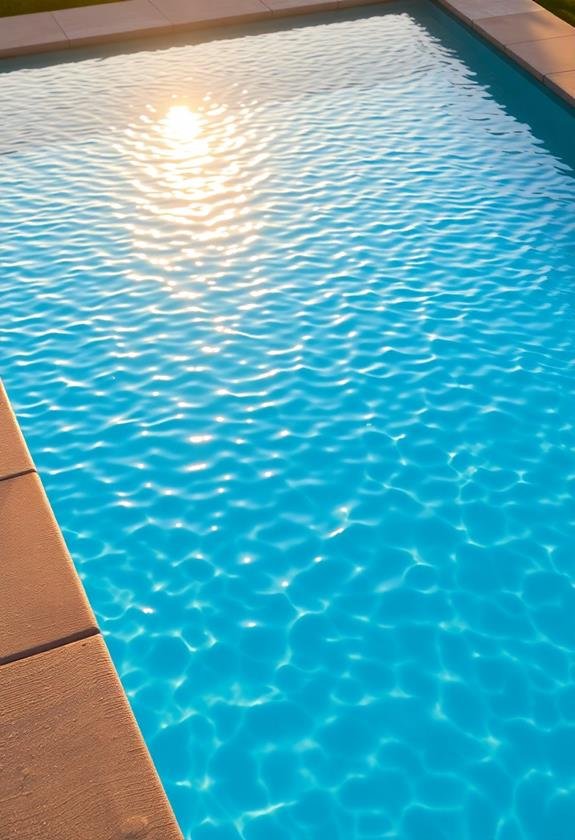
With saltwater pools, maintaining consistent chlorine levels becomes remarkably simple. Your pool’s salt chlorinator works continuously to convert salt into chlorine, ensuring you’ll never experience those dramatic spikes and dips that plague traditional chlorine pools.
It’s like having a tireless pool chemist on duty 24/7, steadily producing just the right amount of sanitizer your pool needs.
You won’t have to worry about those weekly shock treatments or measuring out precise amounts of chemicals. The system automatically produces chlorine when needed, much like a smart thermostat regulates your home’s temperature.
During my years of pool maintenance, I’ve noticed how saltwater pool owners rarely deal with those green water emergencies that traditional pool owners face after heavy rain or intense heat waves.
The beauty of this steady chlorination lies in its predictability. You’ll typically maintain a chlorine level between 1-3 parts per million, which is ideal for swimming comfort.
Plus, you don’t have to store hazardous chemicals or remember complex dosing schedules. The system simply hums along, keeping your water consistently clean and balanced, day after day.
Safer Water Chemistry
The steady chlorination process of saltwater pools naturally leads to a gentler swimming environment.
You’ll notice that your skin and eyes won’t feel as irritated as they might in traditional chlorine pools, making your swimming experience much more enjoyable.
I’ve found that even my kids, who used to complain about red eyes after swimming, can now splash around for hours without any discomfort.
The safer water chemistry of saltwater pools offers several key advantages:
- You’ll encounter fewer harsh chemical reactions since there’s no need to handle or store concentrated chlorine tablets, making pool maintenance safer for you and your family.
- The balanced pH levels are more stable, which means you won’t have to constantly adjust chemicals like you’d with a traditional pool.
- There’s less risk of chemical burns or accidents since you’re working with simple table salt rather than potentially dangerous chlorine compounds.
- Your pool water maintains a more natural mineral balance, similar to what you’d find in the ocean, which can actually be beneficial for your skin and hair.
Frequently Asked Questions
Can Saltwater Pools Corrode Metal Patio Furniture Placed Near the Pool?
Yes, saltwater from your pool can potentially corrode metal patio furniture if it’s regularly exposed to splash or mist.
You’ll want to keep your metal furniture at least 5-6 feet away from the pool’s edge, and it’s best to choose materials specifically designed to resist corrosion, like aluminum or powder-coated steel.
I’ve learned that wiping down your furniture after pool use and applying a protective coating annually will help extend its life.
How Much Electricity Does a Saltwater Chlorination System Use per Month?
You’ll find that a typical saltwater chlorination system uses about 500-600 watts when running, which translates to roughly $30-50 in monthly electricity costs.
Your actual usage will depend on your pool size and run time – most systems operate 8-12 hours daily during swim season.
If you’re comparing it to traditional chlorine systems, you’re looking at similar power consumption since both need the pump running anyway.
What Is the Ideal Water Temperature for a Saltwater Pool?
Just like a perfect summer day at the beach, you’ll want your saltwater pool to hit that sweet spot temperature-wise.
You’ll find most swimmers are happiest when you maintain your pool between 78-82°F (26-28°C). If you’re using it for exercise, you might prefer it slightly cooler at 77°F, while kids and seniors often enjoy it warmer at 82-84°F.
Keep in mind that you’ll need more chlorine production at higher temperatures.
Can You Use Regular Pool Toys and Floats in Saltwater Pools?
Yes, you can use regular pool toys and floats in your saltwater pool! The salt concentration isn’t high enough to damage most pool accessories.
However, you’ll want to rinse them with fresh water after use to prevent salt residue buildup and extend their life.
I’ve found that inflatable floats, noodles, and plastic toys hold up just fine.
Just be a bit more diligent about cleaning and storing them properly to avoid any salt-related wear.
How Long Does It Take to Convert a Chlorine Pool to Saltwater?
Did you know that 90% of pool conversions can be completed in just 24-48 hours?
You’ll find that converting your chlorine pool to saltwater isn’t a lengthy process. The basic conversion typically takes a weekend, including installing the salt chlorinator system and adding the initial salt.
You’ll need to dissolve about 40-50 pounds of salt per 2,000 gallons of water, and you should be swimming in your new saltwater pool within 2-3 days.

